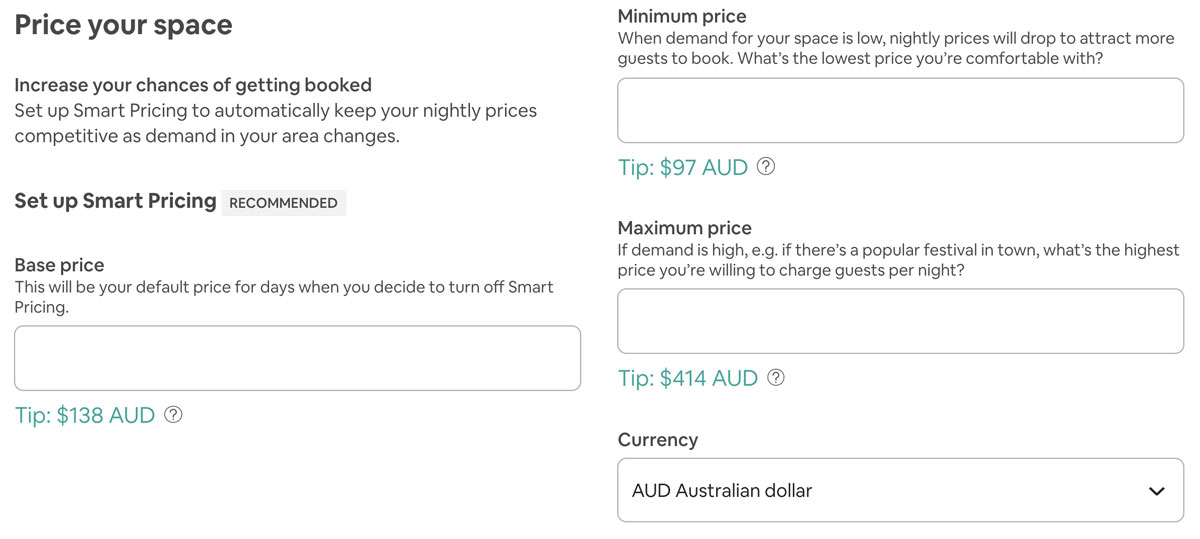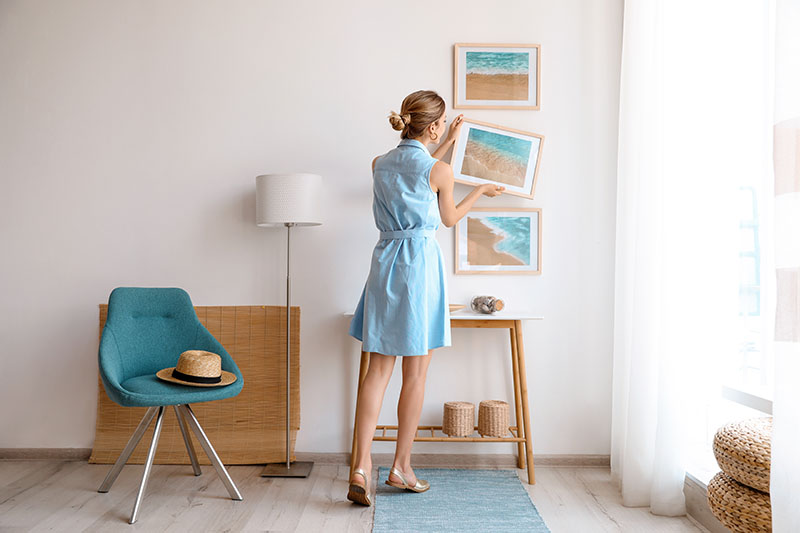Pricing Strategy for Your Airbnb
What you can charge to your guests
There are 4 charges you can ask from guests.
- Daily rate of the accommodation
- Cleaning fee
- Additional guests fee
- Fee for additional service
Where you can really maximise your profit is the first charge – pricing of your Airbnb. That doesn’t mean that you should ignore the rest as they can be useful tools for offering a personalised experience for the guests at extra cost.
But let’s start with the most important piece: your Airbnb pricing.
1. Airbnb Pricing
While the maximum and minimum you can charge are likely set by the value of your property (based on size, location, etc.), you have quite more control over the revenue stream than you realise. Dynamic and smart pricing can help you maximise your revenue.
Airbnb does offer an embedded smart pricing tool but you’d benefit greatly from doing your homework and setting the price based on your own assessment of the market trends.

First, check the prices of other airbnb properties with similar characteristics. Analyse where the price difference between the properties could be coming from – size, location, amenities, etc.
You want to assess the price, occupancy (see their calendar to check for availability for the next 3-6 months), and reviews/ratings for the following properties:
- New properties of similar size in your neighbourhood w/ no ratings
- Properties in your neighbourhood with some ratings (include slightly smaller and larger properties as well)
- Properties in the larger wider region
Doing your research this way should help you get a sense of your pricing strategy for the next few months. If you are a first-time host, you will likely want to offer lower rates to get some initial bookings in place so you can collect some good reviews. Even if you only have a few, all 5-star reviews will allow you to charge a rate almost as high as the superhosts. You can see what the possible range would be by observing the prices of similar properties with high ratings so you know how you can steadily move up on the pricing scale.
The pricing of your airbnb also depends on the supply level in the wider market. This is why you also should do a general scan of the properties in the wider area to account for seasonality and competition. If many properties in the area are booked out for the holiday season, you can potentially charge much higher as anyone booking last minute will be willing to compromise on price and location. Once you’ve collected all data, analyse them to see how much you should charge for the base rate as well as the min & max for smart pricing to guarantee maximum revenue.
During your search, make a note of any pattern you see. For instance, are the properties with fancier photography work generally trending at higher prices? If so, you may want to consider investing in styling and furnishing your house as well as update your listing details to make it more attention-catching.
You want to do this type of analysis often to make sure that you are offering the most optimal rates based on shifting trends (holiday season, events, etc.). If your property is not being booked while others are getting taken off the market during peak season, you may want to lower the price or adjust your listing to improve its appeal to browsers. If your property is getting booked extremely fast, then you may want to up the price as your price might be too low.
In addition to setting the base rates, you can also use layers such as weekday vs. weekend pricing and weekly/monthly discount to maximise occupancy. 5-15% is the normal range. If your property is in high demand and it’s during peak season, you could lower the discount range as the opportunity cost of not having long-term booking is miniscule. Conversely, you can offer a higher rate during off-peak seasons to improve occupancy rate. Keep in mind that accommodating long-term stay requires you to restock amenities in bulk before the guest arrives.
2. Cleaning Fees
Hosts charge anywhere between $40 and $250 for cleaning depending on the property size. Due to COVID-19 risks, Airbnb announced a much stricter cleaning checklist which will likely increase the fees charges. It is pretty common for the guests to bear the cost of the cleaning fees. The higher the cleaning fee, the more guests will resent if they are required to do a lot of the housekeeping themselves. Some property managers will simply charge the guests the entire cleaning fee while some will bear a small portion of it. Again, it depends on the competitive position of your listing.
3. Additional Guest Fee
Many listings offer guests to add one or two more guests at an extra cost per night. This gets fed into your airbnb revenue and Airbnb takes its 3% commission on it. How you use this tool is really a strategic decision, rather than a financial one. The revenue you earn from the extra fee is minimal.
If your house is big enough, having another guest is not that big of a deal. So if you offer this for free or at a very low rate, it may be a curatable bonus to enhance guest experience. However, allowing your guests to add guests for free could lead at least some to bring on a hoard of people without your knowledge which exponentially increases the risk of property damage. It also could make quality management more challenging since they’ll likely be short of many of the amenities you provided for a smaller number of people.
4. Fee for additional services
If you have guests who have special requests such as a pet or airport pickups, you can reach an agreement with the guest and file a claim through Airbnb resolution centre (“Request payment for extra services”). These fees, at least as of today, are not subjected to Airbnb servicing fee or commission for guests and hosts. If you are willing to get creative in offering additional services, this could generate a nice additional income and also greatly enhance the quality of guest experience.
Other helpful tips for hosts:









